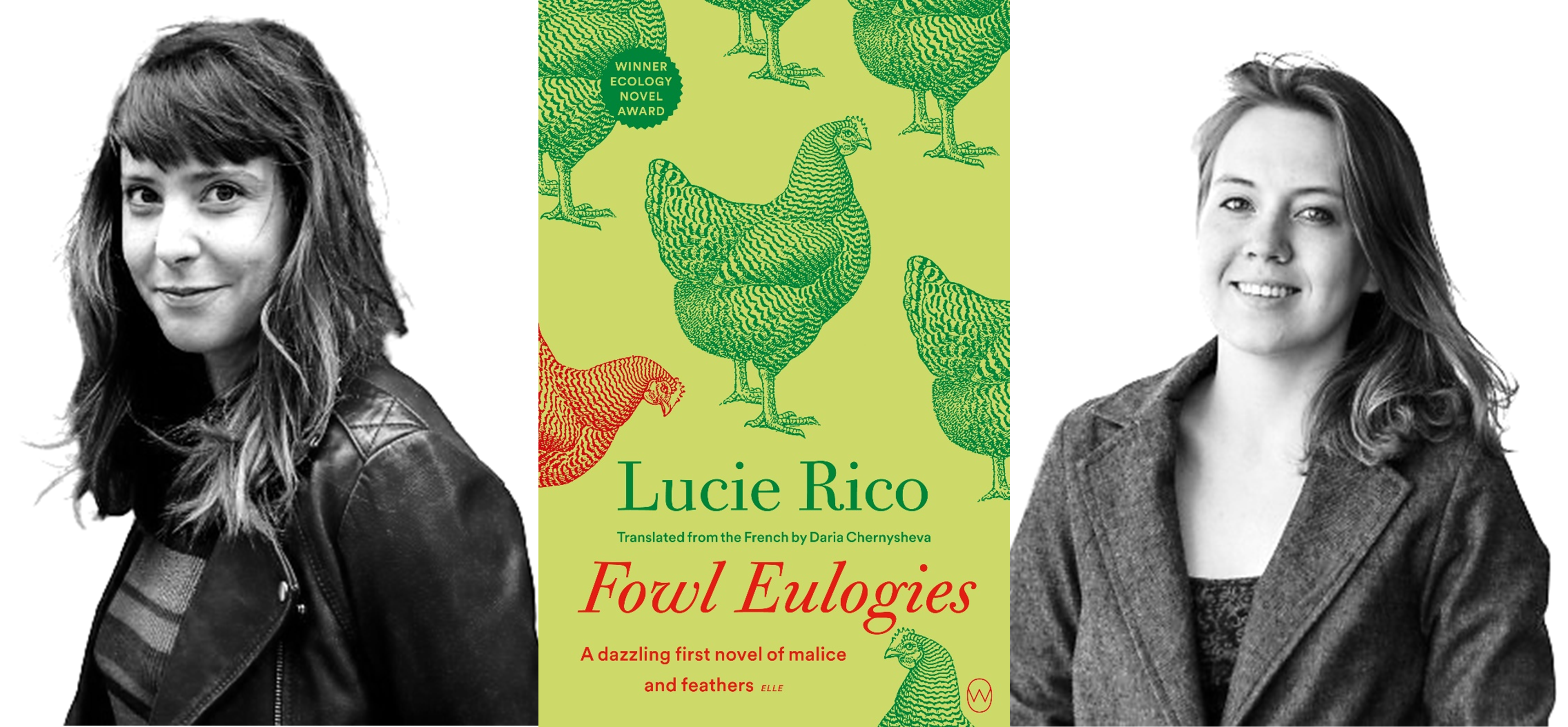
 Translated from the French by Daria Chernysheva.
Translated from the French by Daria Chernysheva.
With plugs stuffed into her ears, Paule sets up her stall. The plane trees in the square have been replaced by palms, which began to rot as soon as they were planted. The intention had been to transform the area into a tropical oasis, but the climate had other ideas. The palm trees—dried out, infested with parasites—are the same color as the walls of the houses in the village.
Paule has been relegated to the back end of the market, into a little corner near the church. The customers have to walk past all the other vendors, the twenty or so regulars, before they arrive at her stand. There is no crowd just yet, but already the air is full of premature wailing as the vendors warm up their voices for the day’s activity. The smell of meat mingles with the smell of fish. The others eye Paule in her corner: What’s the vegetarian doing here? She ought to have left by now. It has been ten years since she was last seen at the market.
Benjamin, standing behind his counter, winks at Paule. The old lecher has lost all his hair. He has lost his permit too. Paule suspects him of peddling defrosted fish he obtains from the nearest supermarket whenever the farmers’ own supply of pollock, salmon, and shrimp is running dry. Or so Ma had led her to believe over the course of their Sunday phone calls.
Nicolas lays out his cows, inflected into various pieces for grilling, frying, or roasting—chuck, topside, flank, brisket—all of a beautiful, moving red. They used to be joined at the hip at school, Nicolas and Paule. Copying off each other, spending hours on the phone as soon as they got home, hacking the bark off plane trees together. Nicolas looks to have aged in one fell swoop; fatter now, yet still covered in acne. He does not look her way and does not say hello.
Paule continues setting up, despite everything, despite the obvious hostility, despite the fact that Ma’s usual place has been given to a man younger than Paule. This one is well-dressed. His hair is slicked back with gel. He’s not from around here—his skin is too clear for that. A Norman, perhaps? His stand is sophisticated. Little spotlights illuminate the chicken carcasses. Bodies extracted from their packaging are stacked to form a pyramid worthy of a gymnastics event.
Paule says to herself, I killed Théodore.
Her slaughtered chickens, vacuum packed with Ma’s machine, reign alongside several pots of preserves she found in the back of a cupboard. The display is minimalist: five other chickens besides Théodore, and some eggs laid out in a tub upon three wooden boards held up by trestles.
Paule had felt something in killing the one-eyed chicken. A memory from childhood she yearned to revisit. She proceeded to slit several other throats.
But Théodore received special treatment. He has a label, and on that label is his name in big letters, THÉODORE, just above his handwritten biography. Paule was careful to write out the whole word, biography, so that “bio” would not be confused with the French shorthand for “organic.” She has even included dates, as regulation stipulates: 14 February 2018 – 20 September 2018. A fine gravestone made of plastic.
Now Paule contemplates Théodore as if he were a foreign object, a miniscule monument her words had come to adorn. She rereads these words, admiring them as if it were not she who had written them:
Théodore hailed from open fields. Though unfeterred, independent, and mischievous by nature, Théodore suffered from a disability, a blind eye, which he overcame with his nonchalant and classy manner. Théodore enjoyed walking in circles while pecking grass—but never in the same direction as his companions—as well as running in his own fashion, as if he were dancing. He enjoyed a special relationship with his farmer. It was a bond of intense friendship that only death was able to break.
She places Théodore conspicuously in the center of her stand, using a boiled egg for a pedestal. It is difficult to arrange a meat display. Some stagecraft is required to elicit an untroubled desire to eat. What is dirty or off-putting? What is appetizing? Is it the naked carcass, the bits and pieces, the body whole? The blood? Should the appendices be removed?
Paule continues this silent interrogation of her dead chickens. She smiles weakly and fixes her gaze on the sign opposite, which reads Frontière/Frontera and delineates the village border. The shoppers do not come to her stand. They buy their Sunday dinners from the Norman. Even the villagers themselves. Even Ma’s friends. They do not greet Paule. At the funeral, at least, they shook her hand. Did she do something wrong in that moment? She wants to cry out, I’m not doing this for me, I’m doing it for my mother! Come take Théodore off my hands and that’ll be the end of it. I have a man to get back to.
Instead she hawks, “The chickens of Évelyne Rojas, raised on spring water!” The words come out in a fusillade. The result is immediate: four people materialize in front of her stand. They walk arm-in-arm, their bodies linked. A family of tourists. One of the children is a teenager—more sneering than his brother, with an ugly look in his eye, and pupils so wide he surely must have been out smoking pot. The mother bestows a courteous smile upon Paule. Her teeth are very white.
“You’ve taken over the farm? Has Évelyne retired?” The polished Parisian accent makes her words disagreeable.
“She’s dead.”
The announcement has its effect: the mother shrinks back, crosses her arms, and looks to her husband for help but he is busy redoing the younger kid’s laces. She will have to go for it alone. The mother’s tongue moves in her mouth, knocks against her teeth; the words drown in her saliva. She is sorry, she murmurs, and the accent is gone. In that moment Paule swears the woman is going to ask, What happened? or How did she die?—but nothing comes out. The woman smiles, wrings her hands, and then exclaims:
“Today we’re having chicken!”
Her gaze falls on Théodore. She looks for the sell-by date and reads Théodore’s biography. Her eyebrows furrow as she scans the eulogy. Paule wrings her own hands, nervous. This is the first time someone else is reading the biography. She interrupts the woman:
“It’s a very good chicken.”
The woman has already turned around. She shakes the packaging before the whole family and the flesh within trembles. Paule would like to grab Théodore back. She is afraid he may fall to the ground. She thinks of the urn: it would soon be time to scatter Ma’s ashes, and maybe the marketplace could be a good spot.
“Honey, look, it’s the chicken’s biography!”
The husband bends feebly over the label and raises his head after having read the first two lines. “Do you do this for all your animals?” One of the kids, the teenager, grabs the packaging. He murmurs to his brother, “Look, there’s a spelling mistake.” His finger presses down on the mistake, squashing Théodore’s body. Paule exhales loudly. The mother senses tension. Paule sells Théodore.
Lucie Rico is an author, screenwriter, and director hailing from Perpignan in the South of France, and currently based in Paris. She worked for several years in publishing and online media before devoting herself to writing for the page and the screen. She has directed several series and short films and written feature films. In addition, she is an associate professor in creative writing at the University of Clermont Auvergne. Fowl Eulogies, a 2024 PEN Translation Prize Finalist, was awarded both the Prix du Roman d’Ecologie and the Prix Littéraire du Cheval Blanc, and is her first novel.
Daria Chernysheva translates from Russian and French. She completed her MA in Translation Studies at the University of Warwick on a Fulbright Scholarship, and is currently a doctoral candidate in Creative Critical Writing at University College London. She was a recipient of the 2019 French Voices Award for excellence in translation. Her work has appeared in the Brooklyn Rail, Triple Canopy, AzonaL, Comparative Drama, and Tether’s End, and her translation of Fowl Eulogies was a 2024 PEN Translation Prize Finalist.
This excerpt from FOWL EULOGIES was published by permission of World Editions. Copyright © Lucie Rico, 2020 (Le Chant du Poulet Sous Vide, P.O.L. Editeur). English translation copyright © Daria Chernysheva, 2023.
Published on June 17, 2024.




